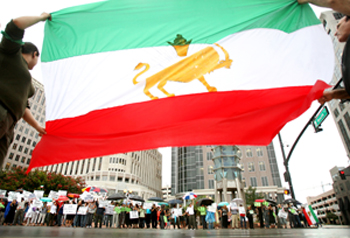Revolutions Overthrow Public Perception: Success in Egypt Does Not Mean Iran is Ready
Family Experiences and History Tell Us That Hopeful Protests Can End In Grief and Pragmatism
July 23, 2011
Published: March 2, 2011
On Feb. 14, protests broke out again in Iran. Instead of receiving an emoticon heart to celebrate Valentine’s Day, my cousin texted me a frown to mourn the 25th of Bahman. “Why do I feel so pessimistic about these new protests,” I asked her. “Because we’ve seen them before,” my cousin responded.

In June of 2009, the results of the presidential election enraged numerous Iranians. Although there have been protests before in Iran, that summer, tens of thousands of people marched on the streets. Then and there they heralded into existence the dissident Green Movement.
My cousin and I are young American adults whose parents immigrated to the States in the wake of the Islamic Revolution in 1979. Our mothers (who are sisters) have been taking us back to their home country since we were toddlers. When we are in the States, we indulge ourselves in Dunkin’ Donuts, Beyoncé and interpretations of the Second Amendment. When we fly into Iran, we nonchalantly don our head covers and our long jackets. As we step off of our KLM planes, we immerse ourselves in a different environment.
We greet the security guards at the airport in Farsi. As we wait for our cousins to hail a taxi, we inhale the nicotine, gasoline and sweat of Iran and suddenly our hearts pain with joy. We observe the Peugeot sedans and the Khomenei-murals as our uncle drives us home. Then we anxiously walk to the front of our grandmother’s apartment building. Our mothers kiss her and cry with her as their head covers fall. We sit in our uncle’s living room, watch Iranian and Lebanese music videos and constructively criticize them for not being up to par with the American entertainment industry. We walk around the city, admire the jewelry stores and the tall, lean Iranian boys. We go to family gatherings, eat kabab and listen to relatives sing folk songs. And every time my mother starts packing for our return to the States, I get in a fight with her. “I don’t want to go back,” I assert.
For the first couple of weeks after June 13, footage of the protests was everywhere. My cousin and I were so irrationally excited. She attended candle light vigils in Chicago and I attended block-long protests in front of the U.N. Our Facebook profiles were splashed with Green. We cried out of mourning for the casualties and out of excitement for possibilities. Our parents, on the other hand, were disarmingly negative. They witnessed a revolution already. My father laments to this day, “Evil men came and took my country away from me.” My mother once told me that she cried for hours in the shower. She did not want fear to permeate into her entire perception of the movement. However, our parents couldn’t help that when they talked about Moussavi, a nauseous feeling plugged their throats. Ironically, my cousin and I feel the same way today and last week when Americans got excited about the protests on the 25th of Bahman.
The day Mubarak left Egypt was one of the greatest moments of my life. However, after returning to Iran last July (to a revival of protests), I learned from my family that Iran is not ready for another revolution. My relatives disclosed in tense words their grief and their pragmatism. My cousins would reminisce about friends that were incarcerated for taking a wounded protester into shelter. “You have no idea what happened here,” one of them said. Abruptly, my passion for change rotted into something naïve and ignorant.
This month, Facebook statuses and tweets started changing into exclamations that “Iran is next.” When I read them I experienced that same feeling that numbed my parents’ throats and quelled their excitement. When it was June of 2009 or December of 2009, I glued myself to any news source. When Feb. 14, 2011 came around, I avoided Democracy Now! and my New York Times updates. When the protests stopped, I watched footages and political commentary on it. I have a bleeding support for my motherland and it may at times transcend logic, but my experiences teach me that Iran is not ready for a revolution here and now.









